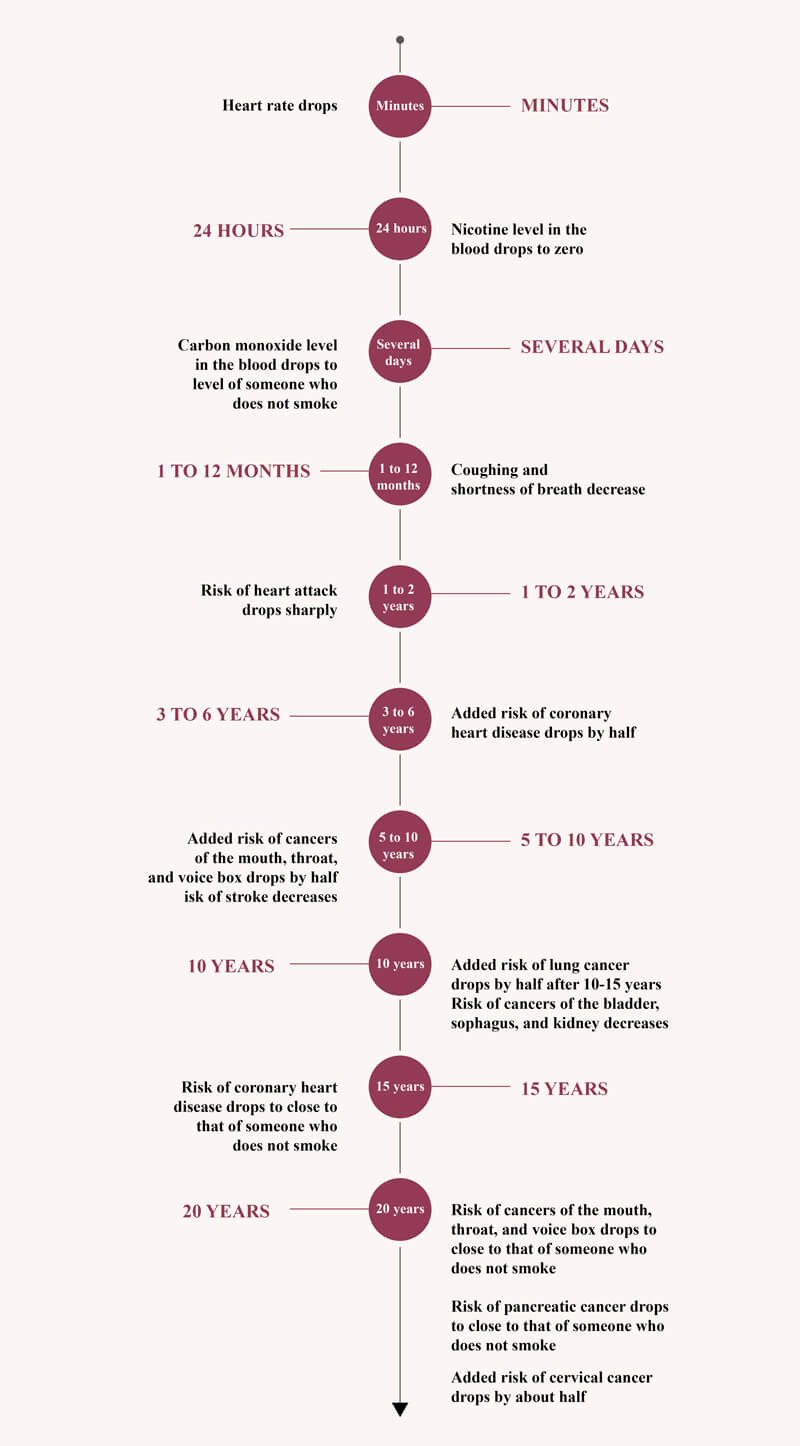Why Do People Smoke?
The reasons why people smoke include the following situations: social occasion or event, smoking-related daily habits, when emotions arise, nicotine addiction, etc.
social occasion or event
For example, you may crave cigarettes when you:
- Saw someone smoking
- Smell of cigarette smoke
- Hang out with people who smoke or use other tobacco products
- Attend parties or other social events
- Drink alcohol or go to a bar
- Celebrate a big event
- go to a concert
Daily habits related to smoking
Many people have daily patterns or routines related to smoking. For example:
- After getting up in the morning
- While surfing on your phone
- Wait for the bus or ride
- Seeing cigarette ads throughout the day
- Drink coffee
- Take breaks from work
- Watch TV or play video games
- Walk or drive
when emotions arise
Emotions may be the reason why you smoke. Some people smoke because they want to get rid of a bad mood or make a good mood feel better.
You may notice a desire to smoke when you feel negative emotions, such as:
- Stressed or anxious
- Lonely
- boring
- angry
- sad
- frustrated or upset
Positive emotions can also trigger the urge to smoke, such as when you feel:
- happy
- excited
- relieved
nicotine addiction
For example:
- Feeling irritable after not smoking for a while
- Feeling restless or nervous
- Have a strong desire to smoke
- Difficulty concentrating on things
Nicotine is the main addictive substance in cigarettes and other forms of tobacco. Nicotine is a drug that affects many parts of your body, including your brain. Over time, your body and brain get used to having nicotine in them. About 80–90% of people who smoke regularly are addicted to nicotine.
Nicotine reaches your brain within 10 seconds of when it enters your body. It causes the brain to release adrenaline, and that creates a buzz of pleasure and energy. The buzz quickly fades, though. Then you may feel tired or a little down—and you may want that buzz again.
Your body is able to build up a high tolerance to nicotine, so you’ll need to smoke more cigarettes to get that same buzz. This up and down cycle happens over and over. That’s what leads to addiction.
References
Know Your Vaping Triggers.smokefree.gov.https://smokefree.gov/quit-vaping-resources/know-your-vaping-triggers.Date accessed April 8 2024.
Reasons People Smoke. veterans.smokefree.gov.https://veterans.smokefree.gov/nicotine-addiction/reasons-people-smoke.Date accessed April 8, 2024.
Why Do You Want to Quit smoking?
Want to look, feel, and be healthier:
- My chances of having cancer, heart attacks, heart disease, stroke, cataracts, and other diseases will go down.
- I will be less likely to catch colds or the flu, and will be able to recover quicker if I do get sick.
- I will breathe easier and cough less.
- My blood pressure will go down.
- My skin will look healthier and I will look more youthful.
- My teeth and fingernails will not be stained.
- The air exhaled from my mouth will become fresher.
- My taste buds are much better too.
Want a better lifestyle
- I will have more money to spend.
- I can spend more time with family, catch up on work, or dive into my favorite hobby.
- I won’t have to worry about when I can smoke next or where I can or can’t smoke.
- My food will taste better.
- My clothes will smell better.
- My car‚ home‚ and kids won’t smell like smoke.
- My pet will be healthier.
- I will be able to smell food, flowers, and other things better.
Want a better family life
- I will set a great example for my kids; it takes a lot of strength to quit.
- My friends, family, co-workers, and other loved ones will be proud of me.
- I will protect my friends and family from the dangers of secondhand smoke.
- My children will be healthier.
- I will have more energy to do the things I love with friends and family.
- I will get healthy to make sure I am around to share in my family’s special moments.
- we are going to have a baby.
- We are preparing for pregnancy.
Are you ready to quit smoking now?
References
Why Do You Want to Quit.smokefree.gov.https://smokefree.gov/quit-smoking/why-you-should-quit/why-do-you-want-to-quit. Date accessed April 7, 2024.
Effects of smoking on health
Smoking harms nearly every organ of the body. Some of these harmful and negative effects are immediate. Find out the health effects of smoking on different parts of your body.
Brain
Nicotine from cigarettes is as addictive as heroin. Nicotine addiction is hard to beat because it changes your brain. The brain develops extra nicotine receptors to accommodate the large doses of nicotine from tobacco. When the brain stops getting the nicotine it’s used to, the result is nicotine withdrawal. You may feel anxious, irritable, and have strong cravings for nicotine.
Head and Face
Ears
One effect of smoking is reduced oxygen supply to the cochlea, a snail-shaped organ in the inner ear. This may result in permanent damage to the cochlea and mild to moderate hearing loss.
Eyes
Smoking causes physical changes in the eyes that can threaten your eyesight. One of the effects of nicotine from cigarettes restricts the production of a chemical necessary for you to be able to see at night. Also, smoking increases your risk of developing cataracts and macular degeneration (both can lead to blindness).
Mouth
Smoking takes a toll on your mouth. Smokers have more oral health problems than non-smokers, like mouth sores, ulcers and gum disease. You are more likely to have cavities and lose your teeth at a younger age. You are also more likely to get cancers of the mouth and throat.
Face
Smoking can cause your skin to be dry and lose elasticity, leading to wrinkles and stretch marks. Your skin tone may become dull and grayish. By your early 30s, wrinkles can begin to appear around your mouth and eyes, adding years to your face.
Heart
Stressed Heart
Smoking raises your blood pressure and puts stress on your heart. Over time, stress on the heart can weaken it, making it less able to pump blood to other parts of your body. Carbon monoxide from inhaled cigarette smoke also contributes to a lack of oxygen, making the heart work even harder. This increases the risk of heart disease, including heart attacks.
Sticky Blood
Smoking makes your blood thick and sticky. The stickier the blood, the harder your heart must work to move it around your body. Sticky blood is also more likely to form blood clots that block blood flow to your heart, brain, and legs. Over time, thick, sticky blood damages the delicate lining of your blood vessels. This damage can increase your risk for a heart attack or stroke.
Fatty Deposits
Smoking increases the cholesterol and unhealthy fats circulating in the blood, leading to unhealthy fatty deposits. Over time, cholesterol, fats, and other debris build up on the walls of your arteries. This buildup narrows the arteries and blocks normal blood flow to the heart, brain, and legs. Blocked blood flow to the heart or brain can cause a heart attack or stroke. Blockage in the blood vessels of your legs could result in the amputation of your toes or feet.
Lungs
Scarred Lungs
Smokers’ lungs experience inflammation in the small airways and tissues of your lungs. This can make your chest feel tight or cause you to wheeze or feel short of breath. Continued inflammation builds up scar tissue, which leads to physical changes to your lungs and airways that can make breathing hard. Years of lung irritation can give you a chronic cough with mucus.
Emphysema
Smoking destroys the tiny air sacs, or alveoli, in the lungs that allow oxygen exchange. When you smoke, you are damaging some of those air sacs. Alveoli don’t grow back, so when you destroy them, you have permanently destroyed part of your lungs. When enough alveoli are destroyed, the disease emphysema develops. Emphysema causes severe shortness of breath and can lead to death.
Cilia and Respiratory Infections
Your airways are lined with tiny brush like hairs, called cilia. The cilia sweep out mucus and dirt so your lungs stay clear. Smoking temporarily paralyzes and even kills cilia. This makes you more at risk for infection. Smokers get more colds and respiratory infections than non-smokers.
DNA
Cancer
Your body is made up of cells that contain genetic material, or DNA, that acts as an “instruction manual” for cell growth and function. Every single puff of a cigarette causes damages to your DNA. When DNA is damaged, the “instruction manual” gets messed up, and the cell can begin growing out of control and create a cancer tumor. Your body tries to repair the damage that smoking does to your DNA, but over time, smoking can wear down this repair system and lead to cancer (like lung cancer). One-third of all cancer deaths are caused by tobacco.
Stomach and Hormones
Belly
Need another reason why smoking is bad for you? Bigger belly. Smokers have bigger bellies and less muscle than non-smokers. They are more likely to develop type 2 diabetes, even if they don’t smoke every day. Smoking also makes it harder to control diabetes once you already have it. Diabetes is a serious disease that can lead to blindness, heart disease, kidney failure, and amputations.
Lower Estrogen Levels
Smoking lowers a female’s level of estrogen. Low estrogen levels can cause dry skin, thinning hair, and memory problems. Women who smoke have a harder time getting pregnant and having a healthy baby. Smoking can also lead to early menopause, which increases your risk of developing certain diseases (like heart disease).
References
Health Effects.smokefree.gov. https://smokefree.gov/quit-smoking/why-you-should-quit/health-effects.Date accessed April 7, 2024.
Health Benefits of Quitting Smoking Over Time
Over time, people who quit smoking see many benefits to their health. After you smoke your last cigarette, your body begins a series of positive changes that continue for years.

References
Benefits of Quitting.CDC. https://www.cdc.gov/tobacco/quit_smoking/how_to_quit/benefits/.Date accessed April 7, 2024.

